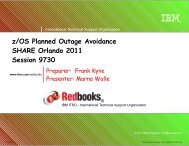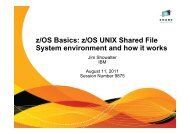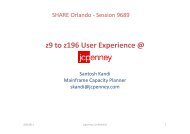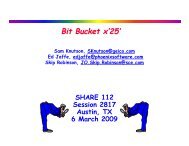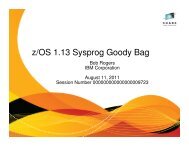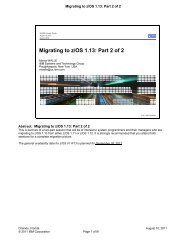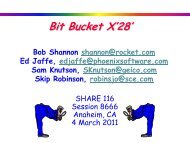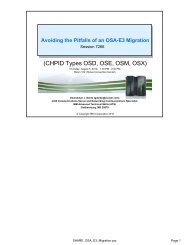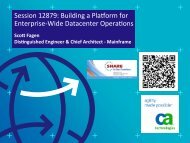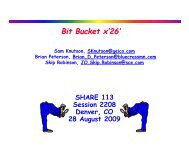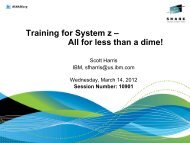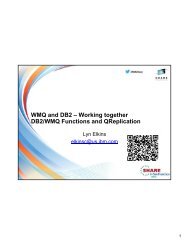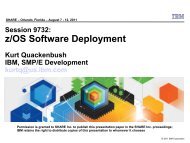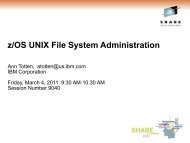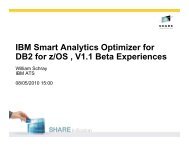Session 9689 handout 1259 0.pdf
Session 9689 handout 1259 0.pdf
Session 9689 handout 1259 0.pdf
Create successful ePaper yourself
Turn your PDF publications into a flip-book with our unique Google optimized e-Paper software.
SHARE Orlando - <strong>Session</strong> <strong>9689</strong><br />
IBM z196 zEnterprise<br />
George Handera<br />
HanderaG@Aetna.com<br />
© 2010 IBM Corporation
SHARE Orlando - <strong>Session</strong> <strong>9689</strong><br />
IBM z196 zEnterprise<br />
Trademarks<br />
The following are trademarks of the International Business Machines Corporation in the United States, other countries, or both.<br />
Not all common law marks used by IBM are listed on this page. Failure of a mark to appear does not mean that IBM does not use the mark nor does it mean that the product is not<br />
actively marketed or is not significant within its relevant market.<br />
Those trademarks followed by ® are registered trademarks of IBM in the United States; all others are trademarks or common law marks of IBM in the United States.<br />
For a complete list of IBM Trademarks, see www.ibm.com/legal/copytrade.shtml:<br />
*, AS/400®, e business(logo)®, DBE, ESCO, eServer, FICON, IBM®, IBM (logo)®, iSeries®, MVS, OS/390®, pSeries®, RS/6000®, S/30, VM/ESA®, VSE/ESA,<br />
WebSphere®, xSeries®, z/OS®, zSeries®, z/VM®, System i, System i5, System p, System p5, System x, System z, System z9®, BladeCenter®<br />
2<br />
The following are trademarks or registered trademarks of other companies.<br />
Adobe, the Adobe logo, PostScript, and the PostScript logo are either registered trademarks or trademarks of Adobe Systems Incorporated in the United States, and/or other countries.<br />
Cell Broadband Engine is a trademark of Sony Computer Entertainment, Inc. in the United States, other countries, or both and is used under license therefrom.<br />
Java and all Java-based trademarks are trademarks of Sun Microsystems, Inc. in the United States, other countries, or both.<br />
Microsoft, Windows, Windows NT, and the Windows logo are trademarks of Microsoft Corporation in the United States, other countries, or both.<br />
Intel, Intel logo, Intel Inside, Intel Inside logo, Intel Centrino, Intel Centrino logo, Celeron, Intel Xeon, Intel SpeedStep, Itanium, and Pentium are trademarks or registered trademarks of Intel<br />
Corporation or its subsidiaries in the United States and other countries.<br />
UNIX is a registered trademark of The Open Group in the United States and other countries.<br />
Linux is a registered trademark of Linus Torvalds in the United States, other countries, or both.<br />
ITIL is a registered trademark, and a registered community trademark of the Office of Government Commerce, and is registered in the U.S. Patent and Trademark Office.<br />
IT Infrastructure Library is a registered trademark of the Central Computer and Telecommunications Agency, which is now part of the Office of Government Commerce.<br />
* All other products may be trademarks or registered trademarks of their respective companies.<br />
Notes:<br />
Performance is in Internal Throughput Rate (ITR) ratio based on measurements and projections using standard IBM benchmarks in a controlled environment. The actual throughput that any user will<br />
experience will vary depending upon considerations such as the amount of multiprogramming in the user's job stream, the I/O configuration, the storage configuration, and the workload processed.<br />
Therefore, no assurance can be given that an individual user will achieve throughput improvements equivalent to the performance ratios stated here.<br />
IBM hardware products are manufactured from new parts, or new and serviceable used parts. Regardless, our warranty terms apply.<br />
All customer examples cited or described in this presentation are presented as illustrations of the manner in which some customers have used IBM products and the results they may have achieved. Actual<br />
environmental costs and performance characteristics will vary depending on individual customer configurations and conditions.<br />
This publication was produced in the United States. IBM may not offer the products, services or features discussed in this document in other countries, and the information may be subject to change without<br />
notice. Consult your local IBM business contact for information on the product or services available in your area.<br />
All statements regarding IBM's future direction and intent are subject to change or withdrawal without notice, and represent goals and objectives only.<br />
Information about non-IBM products is obtained from the manufacturers of those products or their published announcements. IBM has not tested those products and cannot confirm the performance,<br />
compatibility, or any other claims related to non-IBM products. Questions on the capabilities of non-IBM products should be addressed to the suppliers of those products.<br />
Prices subject to change without notice. Contact your IBM representative or Business Partner for the most current pricing in your geography.<br />
2
SHARE Orlando - <strong>Session</strong> <strong>9689</strong><br />
IBM z196 zEnterprise<br />
Agenda<br />
• Introduction/Background<br />
• Implementation considerations<br />
• Hardware feature comparison<br />
• Hiperdispatch<br />
• Experiences and observations<br />
3<br />
3
SHARE Orlando - <strong>Session</strong> <strong>9689</strong><br />
IBM z196 zEnterprise<br />
George Handera - SE Capacity<br />
Introduction/Background<br />
Aetna has 2 datacenters - 25 miles apart<br />
14 - 2097’s and 1 - 2817<br />
Each datacenter has a pair of external CF CECs<br />
One datacenter has 1 SYSPLEX over 8 CECs - heavy Datasharing<br />
over 16 ICB4 links<br />
Second datacenter 6 SYSPLEXES over 6 CECs plus the ESP box<br />
Datasharing load is light over PSIFB and ICB4 links<br />
4<br />
4
SHARE Orlando - <strong>Session</strong> <strong>9689</strong><br />
IBM z196 zEnterprise<br />
• What’s new with the z196<br />
• Energy attributes<br />
• New level of cache on the CHIP<br />
• New instruction support for C and Java environments<br />
• Vertical scalability - applies to the LPAR as well as the CEC<br />
• Large Page support evolving - benefits Websphere and DB2 workloads<br />
• ETR timing no longer supported, STP implementation requires<br />
• ICB4 links (high speed Coupling Facility links) no longer supported,<br />
PSIFB links best option for ICB4 replacement.<br />
5
SHARE Orlando - <strong>Session</strong> <strong>9689</strong><br />
IBM z196 zEnterprise<br />
Implementation Considerations<br />
• Cooling - Water option available, our box is Air cooled<br />
• Power - DC option available, our box runs AC<br />
• STP no longer an option – time to get rid of the timer!<br />
We initially established a Mixed-CTN to support the 2817<br />
• PSIFB – While Infiniband is not new, the 2097 was the last<br />
machine that supports ICB4 links.<br />
PSIFB becomes the replacement technology on the 2817. Our ESP<br />
testing experience focused on PSIFB for the Coupling Facility.<br />
6<br />
6
SHARE Orlando - <strong>Session</strong> <strong>9689</strong><br />
IBM z196 zEnterprise<br />
Feature Comparison Table z9, z10 and z196<br />
Series<br />
Model<br />
Number<br />
of CPU’s<br />
Mips<br />
Max<br />
Memory<br />
Chip<br />
Cores<br />
Cache<br />
Levels<br />
Bus<br />
Speed<br />
CPU<br />
GHz<br />
CF High Speed<br />
Links<br />
Z9<br />
2094<br />
1 - 54 580 512<br />
GB<br />
DUAL 2 2.7<br />
GB<br />
1.7 16-ICB4<br />
Z10<br />
2097<br />
1 - 64 920 1.5<br />
TB<br />
QUAD 3 6.0<br />
GB<br />
4.4 16-ICB4<br />
16/32-PSIFB<br />
Z196<br />
2817<br />
1 - 80 1200 3<br />
TB<br />
QUAD<br />
w/ shared<br />
cache on chip<br />
4 8.0<br />
GB<br />
5.2 32 PSIFB<br />
7<br />
7
SHARE Orlando - <strong>Session</strong> <strong>9689</strong><br />
IBM z196 zEnterprise<br />
Model Configurations<br />
Number of<br />
Books<br />
2094<br />
MODELS<br />
Max<br />
Engines<br />
2097<br />
MODELS<br />
Max<br />
Engines<br />
2817<br />
MODELS<br />
Max<br />
Engines<br />
1 S08 8 E12 12 M15 15<br />
2 S18 18 E26 26 M32 32<br />
3 S28 28 E40 40 M49 49<br />
4 S38 38 E56 56 M66 66<br />
4 S54 54 E64 64 M80 80<br />
8<br />
8
SHARE Orlando - <strong>Session</strong> <strong>9689</strong><br />
IBM z196 zEnterprise<br />
Power<br />
• z10 was introduced as a green machine<br />
• Power requirements increased substantially for the same book<br />
configuration when a z10 was compared to a z9.<br />
• From a MIP perspective the z9 and z10 were neck to neck on a<br />
MIPS per WATT comparison<br />
• z196 uses less power per book (approx .5 KVA) while<br />
delivering significantly more MIPS per book.<br />
9<br />
9
SHARE Orlando - <strong>Session</strong> <strong>9689</strong><br />
IBM z196 zEnterprise<br />
• These numbers were generated by the power estimation tool.<br />
• Power requirements and MIPS per Book were generated using a<br />
minimum and maximum processors per book.<br />
10
SHARE Orlando - <strong>Session</strong> <strong>9689</strong><br />
IBM z196 zEnterprise<br />
HMC Environmental Display<br />
• Graphic display over time<br />
• Screen capture support<br />
valuable for providing<br />
operations documentation<br />
11
SHARE Orlando - <strong>Session</strong> <strong>9689</strong><br />
IBM z196 zEnterprise<br />
Enhanced Activity Display<br />
Scrollable displays for the categories<br />
12
SHARE Orlando - <strong>Session</strong> <strong>9689</strong><br />
IBM z196 zEnterprise<br />
MCM<br />
6 Processor Chips<br />
2 Level 4 cache Chips<br />
13<br />
13
SHARE Orlando - <strong>Session</strong> <strong>9689</strong><br />
IBM z196 zEnterprise<br />
Model<br />
Avail<br />
CPs<br />
2817 Model Characteristics by Book<br />
1 st Book 2nd Book 3rd Book 4th Book<br />
SAPs Spares Avail<br />
CPs<br />
SAPs Spares Avail<br />
CPs<br />
SAPs Spares Avail<br />
CPs<br />
SAPs<br />
Spares<br />
Max<br />
Memory<br />
for<br />
Model<br />
M15 15 3 2 752<br />
GB<br />
M32 16 3 1 16 3 1 1520<br />
GB<br />
M49 16 3 1 16 3 1 17 3 0 2288G<br />
B<br />
M66 16 3 1 16 3 1 17 3 0 17 3 0 3056G<br />
B<br />
M80 20 3 1 20 3 1 20 4 0 20 4 0 3056G<br />
B<br />
14<br />
14
SHARE Orlando - <strong>Session</strong> <strong>9689</strong><br />
IBM z196 zEnterprise<br />
Processor Chip<br />
• 4 Cores 3 cache levels<br />
• Level 1 cache - 128/64 KB<br />
• Level 2 cache - 1.5 MB<br />
formally known as level 1.5 cache<br />
• Level 3 cache - 24 MB shared by<br />
all cores on a chip<br />
Level 4 cache is on 2 separate<br />
96 MB Chips for 192 MB total<br />
15<br />
15
SHARE Orlando - <strong>Session</strong> <strong>9689</strong><br />
IBM z196 zEnterprise<br />
Cache Comparison<br />
z10<br />
Cache Level<br />
Cache Level<br />
Cache Level<br />
1<br />
1.5<br />
2<br />
128k Data<br />
64k Instr<br />
3 MB 48 MB<br />
book cache<br />
z196<br />
Cache Level<br />
Cache Level<br />
Cache Level<br />
Cache Level 4<br />
1<br />
2<br />
3<br />
128k Data<br />
64k Instr<br />
1.5 MB 24 MB<br />
Cores on chip share<br />
192 MB<br />
book cache<br />
16<br />
16
SHARE Orlando - <strong>Session</strong> <strong>9689</strong><br />
IBM z196 zEnterprise<br />
Hiperdispatch<br />
Hiperdispatch characteristics are an evolving science<br />
• The Hipervisor continues to align physical processors vertically to a subset of<br />
logical processors (as introduced with the z10)<br />
• WLM’s management of the Affinity nodes has evolved.<br />
– Node affinity scope has changed from same book to same core (sharing level 3<br />
cache influences this change)<br />
– WLM now places work on a weighted basis on the affinity nodes. 4 core<br />
chips/nodes are assigned more work that a<br />
3 core chip.<br />
17<br />
17
SHARE Orlando - <strong>Session</strong> <strong>9689</strong><br />
IBM z196 zEnterprise<br />
RMFIII<br />
Omegamon<br />
18<br />
18
SHARE Orlando - <strong>Session</strong> <strong>9689</strong><br />
IBM z196 zEnterprise<br />
CICS TRANSACTION KEY<br />
Tran Name Threadsafe Description<br />
GHDL No MQ 100 - .25 MS WAITS + 16 Million instructions<br />
per POST<br />
GHC1 YES 1100 fetches per tran out of cache<br />
GHC2 NO 1100 fetches per tran out of cache<br />
GHI0 NO 1000-1100 fetches per tran prefetch I/O<br />
GHI1 YES 1000-1100 fetches per tran prefetch I/O<br />
Transaction Driver - completion based initiation<br />
Reads MQ Queue for transaction specifications for:<br />
• Duration<br />
•Transaction name<br />
• Transaction concurrency<br />
19
Tran Count<br />
SHARE Orlando - <strong>Session</strong> <strong>9689</strong><br />
IBM z196 zEnterprise<br />
Hiperdispatch<br />
z10/Z10 Hiperdispatch On/OFF (8 CP's)<br />
1200000<br />
1000000<br />
800000<br />
600000<br />
400000<br />
200000<br />
0<br />
GHDL GHC1 GHC2<br />
Tran Name<br />
GHI0 GHI1 Total<br />
z10 HIPERDISPATCH ON z10 HIPERDISPATCH OFF<br />
20<br />
Tran GHDL GHC1 GHC2 GHI0 GHI1 total tran<br />
z10 Hiperdispatch<br />
ON 160 598667 36133 35100 367649 1037709<br />
z10 Hiperdispatch<br />
OFF 144 551831 27873 27667 338888 946403<br />
Tran delta 16 46836 8260 7433 28761 91306<br />
% delta 11.11% 8.49% 29.63% 26.87% 8.49% 9.65%<br />
20
Tran Count<br />
GHDL<br />
GHC1<br />
GHC2<br />
GHI0<br />
GHI1<br />
total tran<br />
SHARE Orlando - <strong>Session</strong> <strong>9689</strong><br />
IBM z196 zEnterprise<br />
z196 Hiperdispatch ON vs OFF<br />
1400000<br />
1200000<br />
1000000<br />
800000<br />
600000<br />
400000<br />
200000<br />
0<br />
(8 CPs)<br />
z196 Hiperdispatch ON<br />
z196 Hiperdispatch OFF<br />
21<br />
Tran GHDL GHC1 GHC2 GHI0 GHI1 total tran<br />
z196 Hiperdispatch ON 180 688194 48813 47881 433296 1218364<br />
z196 Hiperdispatch OFF 168 596079 34169 34001 373456 1037873<br />
Tran delta 12 92115 14644 13880 59840 180491<br />
% delta 7.14% 15.45% 42.86% 40.82% 16.02% 17.39%<br />
21
GHDL<br />
GHC1<br />
GHC2<br />
GHI0<br />
GHI1<br />
total tran<br />
SHARE Orlando - <strong>Session</strong> <strong>9689</strong><br />
IBM z196 zEnterprise<br />
z10 8 way vs z196 6 way<br />
Tran Count<br />
1200000<br />
1000000<br />
800000<br />
600000<br />
400000<br />
200000<br />
0<br />
Z10<br />
8 CPs<br />
z10 Hiperdispatch on<br />
Z196<br />
6 CPs<br />
MIPS 5879 6251<br />
Util% 90% 84%<br />
Tuning WLM or Thread concurrency<br />
May be required<br />
z10 Hiperdispatch on<br />
z196 hiperdispatch on<br />
GHDL GHC1 GHC2 GHI0 GHI1 total tran<br />
z196 Hiperdispatch ON 172 604553 26864 26853 383130 1041572<br />
z10 Hiperdispatch ON 160 598667 36133 35100 367649 1037709<br />
Tran delta 12 5886 -9269 -8247 15481 3863<br />
% delta 7.50% 0.98% -25.65% -23.50% 4.21% 0.37%<br />
22<br />
22
SHARE Orlando - <strong>Session</strong> <strong>9689</strong><br />
IBM z196 zEnterprise<br />
Hiperdispatch<br />
• The z196 processor rewards your ability to hold a dispatch!<br />
• MIPS are nice but point of dispatch must also be considered<br />
• Chatty workloads (CICS QR for example) vs Batch or CICS Threadsafe lose<br />
ground to workloads that hold that their dispatch.<br />
• When the point of dispatch is reduced and the MIPS per engine is increased the<br />
capability of the QR throughput increases from an engine perspective. BUT the<br />
competition for that engine also increases<br />
• Machine upgrades often result in more MIPS being delivered by a reduced<br />
number of engines.<br />
• Tuning WLM goals or managing concurrency may be required!<br />
23<br />
23
SHARE Orlando - <strong>Session</strong> <strong>9689</strong><br />
IBM z196 zEnterprise<br />
SYSID Mon Day SH Hour CPI<br />
Prb<br />
State<br />
Est Instr<br />
Cmplx CPI<br />
Est Finite<br />
CPI<br />
Est<br />
SCPL1M L1MP L2P L3P L4LP L4RP MEMP<br />
Rel Nest<br />
Intensity LPARCPU Eff GHz CICS<br />
PAR1 SEP 1 P 16 7.0 31.8 2.8 4.2 50 8.5 69.3 19.0 7.6 3.4 0.7 0.46 1459.4 5.2 QR<br />
PAR2 SEP 1 P 16 4.7 23.4 3.0 1.7 24 7.0 89.2 5.6 4.5 0.1 0.7 0.20 1546.2 5.2 Threadsafe<br />
• Benchmark Description:<br />
– Comprises of CICS transactions and some Batch…<br />
• All Batch is heavy Update and running on both LPARs<br />
• The CICS transactions are cloned pairs. One group is left to run in QR mode and the other is marked threadsafe in the CICS PPT<br />
definition. This test Focused all the Quasi-Reentrant transactions in one LPAR and all the Threadsafe transactions in the other<br />
LPAR. Transaction concurrency was establish in order to drive the LPARs to 90%+ utilization levels.<br />
• Threadsafe Vs QR Results<br />
– CICS 110s<br />
• Increase of 52% of transactions<br />
• Decrease of 42% in CPU per Transaction<br />
• Decrease of average response time by 67% (3.0x)<br />
– RMF 72s – CICS Storage Class<br />
• Ended Transactions up 2.4x<br />
• Response Time down 3.6x<br />
CICS Threadsafe is an option that may help you<br />
reduce CPU cost for applicable transactions by<br />
reducing switches between different TCB types<br />
– SMF 113s – LPAR<br />
• CPI down 1.48x from 7.0 to 4.7<br />
L1MP down 1.5% from 8.5% to 7.0%<br />
L2P up 19.9% from 69.3% to 89.2%<br />
CPU MF example to supplement CICS and<br />
RMF performance metrics<br />
As a secondary data source to understand<br />
why performance may have changed<br />
These numbers come from a<br />
synthetic Benchmark and do not<br />
represent a production workload<br />
24
SHARE Orlando - <strong>Session</strong> <strong>9689</strong><br />
IBM z196 zEnterprise<br />
CPI – Cycles per Instruction<br />
Prb State - % Problem State<br />
Est Instr Cmplx CPI – Estimated Instruction Complexity CPI (infinite L1)<br />
Est Finite CPI – Estimated CPI from Finite cache/memory<br />
Est SCPL1M – Estimated Sourcing Cycles per Level 1 Miss<br />
L1MP – Level 1 Miss %<br />
L15P – % sourced from Level 2 cache<br />
25<br />
L2LP – % sourced from Level 2 Local cache (on same book)<br />
L2RP – % sourced from Level 2 Remote cache (on different book)<br />
MEMP - % sourced from Memory<br />
Rel Nest Intensity – Reflects distribution and latency of sourcing from shared caches and memory<br />
LPARCPU - APPL% (GCPs, zAAPs, zIIPs) captured and uncaptured<br />
Eff GHz – Effective gigahertz for GCPs, cycles per nanosecond<br />
25
SHARE Orlando - <strong>Session</strong> <strong>9689</strong><br />
IBM z196 zEnterprise<br />
HIS<br />
DB2 V10 testing - HIS data<br />
Field defs on next page<br />
• AE91 had 7.5GB (20%) large page allocated<br />
• AE92 had NO Large Page allocated<br />
• BP’s were Pagefix=yes on Jan05 and Pagefix=no on Jan 6<br />
26<br />
26
SHARE Orlando - <strong>Session</strong> <strong>9689</strong><br />
IBM z196 zEnterprise<br />
HIS Field Definitions<br />
HIS Field Definitions<br />
27<br />
27
SHARE Orlando - <strong>Session</strong> <strong>9689</strong><br />
IBM z196 zEnterprise<br />
HIS<br />
DB2 V10 testing - RMF Large Page<br />
28<br />
28
SHARE Orlando - <strong>Session</strong> <strong>9689</strong><br />
IBM z196 zEnterprise<br />
DB2 V10 testing - HIS Observations<br />
Comparing AE91 to AE92<br />
• TLB1MISS improved 1.8% with Large Page<br />
• TLB1CYCL Improved 1.9% with Large Page<br />
• PTEPCTMI showed a 6.9% improvement with Large Page<br />
----------------------------------------------------------------------------------------------------------<br />
• CPI increased 4.7% with Large Page<br />
• PRBSTATE showed an improvement of 3.5% with Large Page<br />
• ESTICCPI increased 3.7%<br />
• MIPSEXEC showed an improvement of 3.4% with Large Page<br />
29<br />
29
SHARE Orlando - <strong>Session</strong> <strong>9689</strong><br />
IBM z196 zEnterprise<br />
Conclusions<br />
DB2 V10 testing - HIS Conclusions<br />
Large Page processing by DB2 showed an increase in the CPI (Cycles Per<br />
Instruction) which must be weighed by the fact that the PRBSTATE mix of<br />
instructions increased. The instruction complexity increased 3.7% and indicated by<br />
the ESTICCPI.<br />
This indicates that the productive processing or application machine path<br />
(business logic vs service support) consumed a greater portion of our processor<br />
capacity.<br />
Overall we seen to have gained about 2% in productivity which becomes<br />
meaningful in an installation with 124 CPs and 21 zAAP engines.<br />
Another factor to consider is the fact that the AE91 LPAR sourced a L4 cache from<br />
the local book 16% less than AE92 (L4LP) and increase the access to L4RP<br />
(remote book) by 46%.<br />
Based on these findings Large Page will be implemented at Aetna for DB2 V10.<br />
30<br />
30
SHARE Orlando - <strong>Session</strong> <strong>9689</strong><br />
IBM z196 zEnterprise<br />
zIIP consumption in DB2 V10 was a pleasant finding as they were not observed in<br />
DB2 V9. The DBM1 address space shows zIIP consumption attributed to an<br />
Enclave that appears to be classified under the MSTR address space.<br />
31<br />
31
Windsor Computer Center<br />
CPU Configuration<br />
Pre PSIFB<br />
SYST Z1 IBM 2097/E56<br />
SYST Z10 IBM 2097/E56<br />
LP22<br />
LP23<br />
DBR5<br />
DBR7<br />
DBRP<br />
DBRQ<br />
DBC1/2<br />
7 Gb<br />
CF21/2<br />
2 Gb<br />
CF61/2<br />
2 Gb<br />
CFW3 and CFW4 2084-303<br />
16Gb Bk=B 18<br />
Each image represents 2 CECs<br />
All Channels replicated<br />
LP24<br />
DB62<br />
LP51<br />
LP52<br />
LP31<br />
LP32<br />
DBR6<br />
zAAP<br />
MIPS**<br />
zAAP<br />
MIPS**<br />
zAAP<br />
MIPS**<br />
zAAP<br />
MIPS**<br />
CF51/2<br />
2 Gb<br />
DBR8<br />
CF31/2<br />
4 Gb<br />
LP93<br />
LP94<br />
DBR1<br />
DBR2<br />
CF9A/B<br />
2 Gb<br />
LP21<br />
LP91<br />
DBR3<br />
LP92<br />
DBRR<br />
DBR9<br />
SYST Z5 IBM 2097/E40<br />
CF911/2<br />
2 Gb<br />
CFW7 and CFW8 2084-302<br />
16 Gb Bk=A<br />
Each image represents 2 CECs<br />
All Channels replicated<br />
LP61<br />
SYST Z2 IBM 2097/E26<br />
Link Types<br />
ICB4<br />
ISC3
Windsor Computer Center<br />
CPU Configuration<br />
Pre PSIFB<br />
SYST Z1 IBM 2097/E56<br />
SYST Z10 IBM 2097/E56<br />
LP22<br />
LP23<br />
DBR5<br />
DBR7<br />
DBRP<br />
DBRQ<br />
DBC1/2<br />
7 Gb<br />
CF21/2<br />
2 Gb<br />
CF61/2<br />
2 Gb<br />
CFW3 and CFW4 2084-303<br />
16Gb Bk=B 18<br />
Each image represents 2 CECs<br />
All Channels replicated<br />
LP24<br />
DB62<br />
LP51<br />
LP52<br />
LP31<br />
LP32<br />
DBR6<br />
zAAP<br />
MIPS**<br />
zAAP<br />
MIPS**<br />
zAAP<br />
MIPS**<br />
zAAP<br />
MIPS**<br />
CF51/2<br />
2 Gb<br />
DBR8<br />
CF31/2<br />
4 Gb<br />
LP93<br />
LP94<br />
DBR1<br />
DBR2<br />
CF9A/B<br />
2 Gb<br />
LP21<br />
LP91<br />
DBR3<br />
LP92<br />
DBRR<br />
DBR9<br />
SYST Z5 IBM 2097/E40<br />
CF911/2<br />
2 Gb<br />
CFW7 and CFW8 2084-302<br />
16 Gb Bk=A<br />
Each image represents 2 CECs<br />
All Channels replicated<br />
LP61<br />
SYST Z2 IBM 2097/E26<br />
Link Types<br />
ICB4<br />
ISC3
Windsor Computer Center<br />
CPU Configuration<br />
Post PSIFB<br />
ZFW3 and ZFW4 2097-706<br />
SYST Z1 IBM 2097/E56<br />
SYST Z10 IBM 2097/E56<br />
LP23<br />
Each image represents 2 CECs<br />
All ICB4 Channels replicated<br />
(PSIFB unchanged to support both CF’s)<br />
LP22<br />
LP24<br />
DB62<br />
DBR5<br />
DBR7<br />
DBRP<br />
DBRQ<br />
CF21/2<br />
6 Gb<br />
CF61/2<br />
6 Gb<br />
CF51/2<br />
4 Gb<br />
CF31/2<br />
6 Gb<br />
CFT1/2<br />
4 Gb<br />
LP51<br />
LP52<br />
LP31<br />
LP32<br />
LPT1<br />
LPT2<br />
DBR6<br />
new image<br />
new image<br />
zAAP<br />
MIPS**<br />
zAAP<br />
MIPS**<br />
zAAP<br />
MIPS**<br />
zAAP<br />
MIPS**<br />
CF9A/B<br />
4 Gb<br />
DBR8<br />
LP93<br />
LP94<br />
DBR1<br />
DBR2<br />
CF91/2<br />
4 Gb<br />
DBC1/2<br />
20 Gb<br />
LP91<br />
LP21<br />
LP92<br />
DBR3<br />
DBRR<br />
DBR9<br />
LP61<br />
SYST Z5 IBM 2097/E40<br />
Link Types<br />
ICB4<br />
PSIFB<br />
SYST Z2 IBM 2097/E26
SYST Z10 IBM 2097/E56<br />
LP23<br />
DBR5<br />
DBR7<br />
DBRP<br />
DBRQ<br />
LP93 DBR1<br />
LP94<br />
DBR2<br />
LP91<br />
DBR3<br />
LP92<br />
DBRR DBR9<br />
SYST Z5 IBM 2097/E40<br />
Windsor Computer Center<br />
CPU Configuration<br />
Post PSIFB<br />
ZFW3 and ZFW4 2097-706<br />
Each image represents 2 CECs<br />
All ICB4 Channels replicated<br />
(PSIFB unchanged to support both CF’s)<br />
CF21/2<br />
6 Gb<br />
CF61/2<br />
6 Gb<br />
CF51/2<br />
4 Gb<br />
CF31/2<br />
6 Gb<br />
CFT1/2<br />
4 Gb<br />
CF9A/B<br />
4 Gb<br />
CF91/2<br />
4 Gb<br />
DBC1/2<br />
20 Gb<br />
Link Types<br />
ICB4<br />
PSIFB<br />
SYST Z1 IBM 2097/E56<br />
LP22<br />
LP24<br />
DB62<br />
zAAP<br />
LP51<br />
MIPS**<br />
zAAP<br />
MIPS**<br />
LP52<br />
zAAP<br />
LP31<br />
MIPS**<br />
zAAP<br />
MIPS**<br />
LP32<br />
LPT1 new image<br />
LPT2 new image<br />
DBR6<br />
DBR8<br />
LP21<br />
LP61<br />
SYST Z2 IBM 2097/E26
SHARE Orlando - <strong>Session</strong> <strong>9689</strong><br />
IBM z196 zEnterprise<br />
PSIFB Connectivity<br />
CF1<br />
CF2<br />
36<br />
PORT 1<br />
PSIB<br />
AID = 08<br />
PSIB<br />
AID = 09<br />
C C C C C C C C C C C C<br />
M S H A M H M S H A M H<br />
O P L B O L O P L B O L<br />
24<br />
3<br />
88<br />
3<br />
F8<br />
3<br />
00 3 08<br />
3<br />
F6<br />
3<br />
25<br />
3<br />
89<br />
3<br />
FA<br />
3<br />
01 3 09<br />
3<br />
FB<br />
3<br />
PSIB<br />
AID = 0A<br />
PSIB<br />
AID = 0B<br />
PORT 1 PORT 2 PORT 1 PORT 2 PORT 1 PORT 2 PORT 1 PORT 2<br />
Z1<br />
W<br />
1D 26 3A<br />
27 28 293B<br />
06 07 08 09 19 1A<br />
A A<br />
A A A<br />
S<br />
E S A A<br />
A A A<br />
A<br />
E<br />
E<br />
E<br />
S<br />
PSIB PSIB E<br />
5<br />
2 S E E PSIB PSIB E E<br />
PSIB PSIB<br />
5<br />
E<br />
E<br />
6<br />
P 1/ AID= 0C AID= 1C 7/ 6<br />
P 1/ 2 6 AID= 0A AID= 1A 2 6 2 AID= 0C AID= 1C 2<br />
4 5<br />
2 4 5 6 3<br />
6 3 8<br />
8<br />
2B 2C 3C 2<br />
2F 9 30 313D<br />
2 0A 0B 0C 0D 1B 1C<br />
PORT 2 PORT 2 PORT 2 PORT 2 PORT 2 PORT 2<br />
NOTE: SOLID LINES ARE<br />
PHYSICAL CONNECTIONS-<br />
DASHED = LOGICAL<br />
PORT 1 PORT 2 PORT 1 PORT 2 PORT 1 PORT 2 PORT 1 PORT 2<br />
PSIB<br />
AID = 08<br />
PORT 1<br />
PORT 1<br />
FA & FB<br />
ARE NEW<br />
FOR EHL<br />
Z2<br />
W<br />
PSIB<br />
AID = 09<br />
PORT 1<br />
C<br />
C C C C<br />
C C<br />
M<br />
E E S M<br />
E E<br />
O<br />
A B C O<br />
A B<br />
26<br />
3<br />
02<br />
3<br />
03<br />
3 3<br />
04 27<br />
3<br />
04<br />
3<br />
05<br />
3<br />
PORT 1<br />
Z10<br />
W<br />
24 88 F8 00 08 F6 25 89 FA 01 09 FB 26 02 03 04 27<br />
04 05<br />
C C C C C C C C C C C C C<br />
C C C C<br />
C C<br />
M S H A M H M S H A M H M<br />
E E S M<br />
E E<br />
O P L B O L O P L B O L O<br />
A B C O<br />
A B<br />
4 4 4 4 4 4 3 4 4 4 4 4 4<br />
4 4 4 4<br />
4 4<br />
PSIB<br />
AID = 0A<br />
PORT 1<br />
NOTE: SOLID LINES ARE<br />
PHYSICAL CONNECTIONS-<br />
DASHED = LOGICAL<br />
Z5<br />
W<br />
PORT 1<br />
7778 797A<br />
A A<br />
A A<br />
E E<br />
E E<br />
9 9 PSIB PSIB 9 9<br />
3/ 1/ AID= 0A AID= 133/<br />
1/<br />
9 9<br />
9 9<br />
7B 4 7C 2<br />
7D 4 7E 2<br />
PORT 2<br />
PSIB<br />
AID = 0B<br />
36
SHARE Orlando - <strong>Session</strong> <strong>9689</strong><br />
IBM z196 zEnterprise<br />
ESP Testing Configuration<br />
Z5W 2097-726 Z15W 2817-730<br />
LP91<br />
LP91<br />
LP92<br />
LP92<br />
CFA<br />
CFC<br />
CFB<br />
CFD<br />
Notes:<br />
• z/OS LPARs may exist on either machine<br />
• CF LPARs<br />
• Z5W has 6 ICF engines<br />
• Z15W has 8 ICF engines<br />
New Cable<br />
Existing Cable<br />
PSIFB LINKS<br />
37<br />
37
SHARE Orlando - <strong>Session</strong> <strong>9689</strong><br />
IBM z196 zEnterprise<br />
2097<br />
2097<br />
L L<br />
L P P L<br />
P 9 9 P<br />
PSIB<br />
9 1/ 1/ 9<br />
1 9 9 2 AID =<br />
2 2<br />
09<br />
B0 B1 B2 B3<br />
L<br />
L<br />
L<br />
P<br />
P C C C C C<br />
PSIB 9 P<br />
C C C C<br />
PSIB PSIB<br />
9 1/ 9 F F F F F<br />
F F F F<br />
AID = 1<br />
AID = AID =<br />
9 1/ A A A B A<br />
A A B A<br />
1B 2 9<br />
09 1B<br />
2<br />
B4 B5 B6 B7 B8 B9 BA BB BC BD BE BF<br />
PORT 1 PORT 1<br />
PORT 2 PORT 2<br />
C<br />
F<br />
C<br />
PORT 1<br />
A0 A1 A2 A3<br />
C<br />
F<br />
C<br />
C<br />
F<br />
D<br />
C<br />
F<br />
C<br />
2817<br />
PSIB<br />
AID =<br />
0B<br />
PSIB<br />
AID =<br />
0C<br />
PORT 1 PORT 1 2817<br />
PORT 1<br />
A4 A5 A6 A7 A8 A9 AA AB AC AD AE AF<br />
C C C C L L<br />
L<br />
L P P L<br />
L<br />
L L<br />
PSIB PSIB P<br />
F F F F P 9 9 P<br />
P<br />
P P<br />
AID = AID = 9<br />
C C D C 9 1/ 1/ 9<br />
9<br />
9 9<br />
1/<br />
1 9 9 2<br />
1<br />
1/ 2<br />
14 15 9 9<br />
2 2<br />
2 2<br />
ESP - Z5W TO Z15W INFINIBAND CONNECTS<br />
38<br />
38
SHARE Orlando - <strong>Session</strong> <strong>9689</strong><br />
IBM z196 zEnterprise<br />
Z15W ESP INFINIBAND CONNECTS<br />
CPU = Z-NEXT (CHP/MODE/LPAR)<br />
AID = 0B<br />
20 Meter<br />
AID = 1B<br />
20 Meter<br />
AID = 0C<br />
10 Meter<br />
AID = 1B<br />
10 Meter<br />
AID = 14<br />
20 Meter<br />
AID = 1C<br />
20 Meter<br />
AID = 15<br />
10 Meter<br />
AID = 1C<br />
10 Meter<br />
PORT 2 PORT 1 PORT 2 PORT 2 PORT 2 PORT 1 PORT 2 PORT 2<br />
50 S 91<br />
51 S 91/92<br />
52 S 91<br />
53 S 91/92<br />
60 D CFC<br />
61 D CFC<br />
62 D CFD<br />
63 D CFD<br />
54 S 91<br />
55 S 91/92<br />
56 S 91<br />
57 S 91/92<br />
64 D CFC<br />
65 D CFC<br />
66 D CFD<br />
67 D CFD<br />
58 S 92<br />
59 S 91/92<br />
5A S 92<br />
5B S 91/92<br />
68 D CFC<br />
69 S CFC<br />
6A D CFD<br />
6B D CFD<br />
5C S 92<br />
5D S 91/92<br />
5E S 91/92<br />
5F D CFC<br />
6C D CFC<br />
6D D CFC<br />
6E S CFD<br />
6F D CFD<br />
2 1 2 2 2 1 2 2<br />
NOTE: CF LPAR’s ‘CFC’ & ‘CFD’ ARE IN LCSS 1 (91/92 ARE IN LCSS 0)<br />
39<br />
39
SHARE Orlando - <strong>Session</strong> <strong>9689</strong><br />
IBM z196 zEnterprise<br />
My First Command<br />
40<br />
40
SHARE Orlando - <strong>Session</strong> <strong>9689</strong><br />
IBM z196 zEnterprise<br />
Pre Z196 - Z10 All ICB4 (1 SYSPLEX)<br />
Z10<br />
Z10<br />
Z10<br />
Z10<br />
z/OS<br />
z/OS<br />
z/OS<br />
Z10<br />
z/OS<br />
CF<br />
Z10<br />
Z10<br />
Z10<br />
Z10<br />
z/OS<br />
z/OS<br />
z/OS<br />
Z10<br />
z/OS<br />
CF<br />
CF has identical link<br />
structure (not Shown)<br />
To prepare for roll of the floor the Z10 z/OS CPCs<br />
received HCA2-O PSIFB cards<br />
41
SHARE Orlando - <strong>Session</strong> <strong>9689</strong><br />
IBM z196 zEnterprise<br />
Z196 and PSIFB connectivity introduced to the SYSPLEX<br />
Z10<br />
Z10<br />
Z10<br />
Z10<br />
z/OS<br />
z/OS<br />
z/OS<br />
Z10<br />
z/OS<br />
Z196<br />
CF<br />
CF<br />
Z10<br />
z/OS<br />
Z10<br />
z/OS<br />
Z10<br />
z/OS<br />
Z10<br />
CF<br />
Z10<br />
z/OS<br />
Z196<br />
CF<br />
CF has identical link<br />
structure (not Shown)<br />
New Z196 CF CPCs installed and PSIFB connectivity was implemented<br />
in addition to the Z10 ICB4 links.<br />
42
SHARE Orlando - <strong>Session</strong> <strong>9689</strong><br />
IBM z196 zEnterprise<br />
z/OS CPC<br />
AID 1D<br />
PORT 1 PORT 2<br />
11 12 13 14 21 22 23 24<br />
NOTE: This should<br />
only be considered if<br />
you currently have<br />
multiple ICF engines<br />
in your existing CF<br />
configuration<br />
1 2 3 4<br />
1 2 3 4<br />
PORT 1 PORT 2<br />
AID 08<br />
PORT 1 PORT 2<br />
AID 08<br />
CF1A - LPAR CF1B - LPAR<br />
CF2A - LPAR CF2B - LPAR<br />
CF1 CPC<br />
CF2 CPC<br />
43
SHARE Orlando - <strong>Session</strong> <strong>9689</strong><br />
IBM z196 zEnterprise<br />
2097<br />
2097<br />
L L<br />
L P P L<br />
P 9 9 P<br />
PSIB<br />
9 1/ 1/ 9<br />
1 9 9 2 AID =<br />
2 2<br />
09<br />
B0 B1 B2 B3<br />
L<br />
L<br />
L<br />
P<br />
P C C C C C<br />
PSIB 9 P<br />
C C C C<br />
PSIB PSIB<br />
9 1/ 9 F F F F F<br />
F F F F<br />
AID = 1<br />
AID = AID =<br />
9 1/ A A A B A<br />
A A B A<br />
1B 2 9<br />
09 1B<br />
2<br />
B4 B5 B6 B7 B8 B9 BA BB BC BD BE BF<br />
PORT 1 PORT 1<br />
PORT 2 PORT 2<br />
C<br />
F<br />
C<br />
PORT 1<br />
A0 A1 A2 A3<br />
C<br />
F<br />
C<br />
C<br />
F<br />
D<br />
C<br />
F<br />
C<br />
2817<br />
PSIB<br />
AID =<br />
0B<br />
PSIB<br />
AID =<br />
0C<br />
PORT 1 PORT 1 2817<br />
PORT 1<br />
A4 A5 A6 A7 A8 A9 AA AB AC AD AE AF<br />
C C C C L L<br />
L<br />
L P P L<br />
L<br />
L L<br />
PSIB PSIB P<br />
F F F F P 9 9 P<br />
P<br />
P P<br />
AID = AID = 9<br />
C C D C 9 1/ 1/ 9<br />
9<br />
9 9<br />
1/<br />
1 9 9 2<br />
1<br />
1/ 2<br />
14 15 9 9<br />
2 2<br />
2 2<br />
ESP - Z5W TO Z15W INFINIBAND CONNECTS<br />
44<br />
44
SHARE Orlando - <strong>Session</strong> <strong>9689</strong><br />
IBM z196 zEnterprise<br />
Switching from ICB4 to PSIFB<br />
• Alter the CFRM Policy to include the new Coupling Facility LPARs<br />
• Place Z10 CF’s in Maintmode<br />
SETXCF START,MAINTMODE,CFNAME=(CF1,CF2)<br />
• Move the structures to the new Z196 CF’s<br />
SETXCF START,REALLOCATE<br />
• Verify structures moved<br />
D XCF,CF,CFNAME=(CF1,CF2)<br />
• Observe<br />
• To backoff<br />
SETXCF STOP,MAINTMODE,CFNAME=(CF1,CF2)<br />
SETXCF START,MAINTMODE,CFNAME=(CF1A,CF1B,CF2A,CF2B)<br />
SETXCF START,REALLOCATE<br />
45
SHARE Orlando - <strong>Session</strong> <strong>9689</strong><br />
IBM z196 zEnterprise<br />
Results/Recommendations<br />
• INFINIBAND performed better than our ICB4 environment / rec: at<br />
least 28 Subchannel Buffers for each LPAR. With ICB4 links I had<br />
bursts of activity that would overrun my subchannel buffers.<br />
• CF Processor Utilization decreased dramatically due to a reduction<br />
in the MP effect and the increased cycle rate on the z196<br />
We went from 2 CF only CPCs with 5 dedicated engines on 2<br />
LPARS, to a configuration with 2 LPARs on each CPC… Each<br />
CPC had a 2 way and 3 way dedicated engine configuration.<br />
The 3 way is targeted with our “Loved ones” (SYNC)<br />
The 2 Way gets the ASYNC traffic.<br />
Note: CFs only know they have a request. They do not know if the<br />
request is SYNC or ASYNC, but the z/OS LPARs do. Sharing SYNC<br />
and ASYNC requests tends to increase the ASYNC service times.<br />
46
SHARE Orlando - <strong>Session</strong> <strong>9689</strong><br />
IBM z196 zEnterprise<br />
47
SHARE Orlando - <strong>Session</strong> <strong>9689</strong><br />
IBM z196 zEnterprise<br />
Lock Structure Comparison - Peak Hour<br />
• Total and SYNC request rate increased<br />
• Total SYNC service time decreased<br />
• Average SYNC service time dramatically reduced<br />
48
SHARE Orlando - <strong>Session</strong> <strong>9689</strong><br />
IBM z196 zEnterprise<br />
Summary of 12 hour Weekday Activity for SYNC and ASYNC Activity<br />
49
SHARE Orlando - <strong>Session</strong> <strong>9689</strong><br />
IBM z196 zEnterprise<br />
Questions?<br />
50<br />
50



